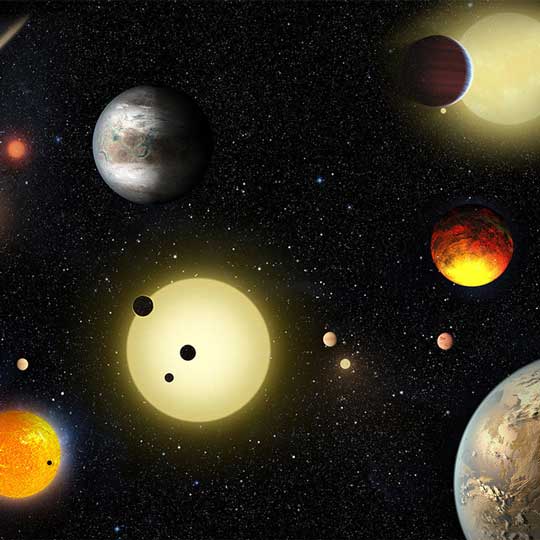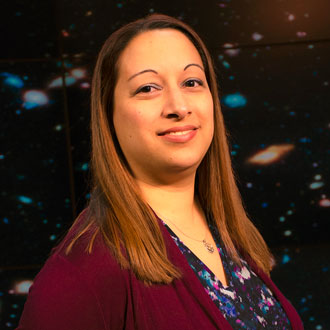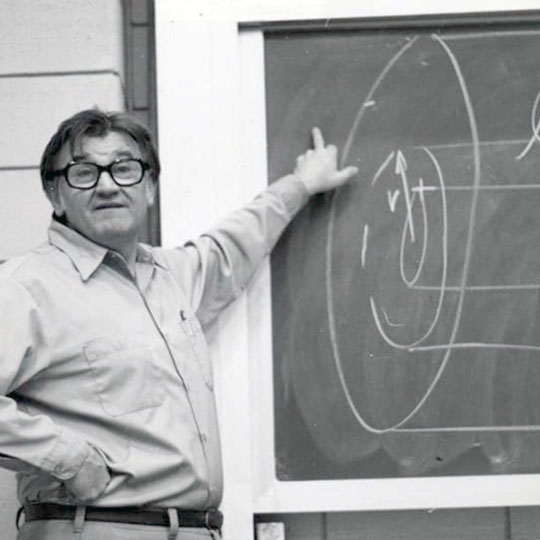Lecture and Science Fair
The Kaczmarczik Lecture, hosted by the Department of Physics, is a significant event at Drexel University. For nearly 30 years, guest lecturers have included numerous Nobel Laureates and renowned scientists from around the world who present on topics that range from mapping the universe to revolutions in fundamental physics. The Kaczmarczik Lecture consistently draws outstanding scientists who are advancing the forefront of physics research.
'Kaczmarczik Day' also features a Science Fair hosted by members of Drexel’s Society of Physics Students and faculty and staff in the Physics department, designed to engage local high school students.
The James Webb Space Telescope: Dawn of a New Era in Astronomy

The world is in an extraordinary era of astronomy – thanks to a suite of existing and upcoming facilities designed to study the universe across the entire electromagnetic spectrum. The James Webb Space Telescope (JWST) is a particularly revolutionary observatory. The JWST successfully launched in late 2021 and is the premier space-based facility for near- and mid-infrared astronomy. The 6.5-meter space telescope includes four state-of-the-art instruments with imaging, spectroscopy, and coronagraphy capability.
Because of these powerful capacities, the JWST offers unprecedented sensitivity and enables detailed studies of planets in our Solar System, distant exoplanets around cool stars, and regions where stars form and die. The Webb Space Telescope's abilities extend even further, ranging out to study galaxies near and far, getting closer than ever to the era after the Big Bang. To aid in that mission, Lockheed Martin designed, built and tested the sophisticated scientific instrument that will serve as the telescope’s primary imager.
Guest lecturer Knicole Colón, PhD, will discuss the latest status of the James Webb Space Telescope and highlight key science results obtained within its first years of operations. Colón will explore how results from the JWST are re-writing textbooks, a trend that will continue for years to come.
2024 Event Details
- Science Fair | 10 a.m. to Noon – Held in Drexel’s Bossone Center, the science fair is free and open to local high schools.
- Lecture | 1-2:30 p.m. – Held in Drexel’s Mitchell Auditorium, Bossone Center, the lecture is free and open to everyone.
- Live Stream – The lecture will be live streamed for remote audiences. The link will be activated on March 7, 2024.

We thank Lockheed Martin for their generous sponsorship of the Kaczmarczik Science Fair and Lecture.
Knicole Colón, PhD – Guest Lecturer

Knicole Colón, PhD, an astrophysicist with NASA’s Goddard Space Flight Center in Greenbelt, MD, is the James Webb Space Telescope (JWST) Deputy Project Scientist for Exoplanet Science and the Project Scientist for the Transiting Exoplanet Survey Satellite (TESS), as well as the Pandora SmallSat missions.
Dr. Colón uses optical and infrared telescopes, including the Hubble Space Telescope, JWST, and TESS, to study “extreme” exoplanets that are unlike any planets in our solar system. Her goal is to learn about the composition of their atmospheres and gain insight into how they formed and evolved.
Colón received her BS in Physics (with a minor in Mathematics) from The College of New Jersey in 2007, where she held a National Hispanic Merit Scholarship. She then obtained her PhD in Astronomy from the University of Florida in 2012. During graduate school, she was awarded a National Science Foundation Graduate Research Fellowship and became a Young Explorer of the National Geographic Society. Since joining NASA’s Goddard Space Flight Center in 2017, Colón has received a NASA Group Achievement Award for her role in an Astrophysics Large Mission Study Team, a NASA Silver Achievement Medal and a NASA Group Achievement Award for her role in the TESS mission, a NASA Group Achievement Award for her role in the JWST mission, a NASA Group Achievement Award for her role in the NASA Exoplanet Explorers team, and a NASA Exceptional Scientific Achievement Medal for her research on the extremely inflated exoplanet known as KELT-11b.
About Paul Kaczmarczik

The Kaczmarczik Lecture Series was established in 1995 to honor beloved Drexel University Professor of Physics Paul Kaczmarczik. Professor Kaczmarczik attended Drexel as a student, graduating with a BS in physics in 1948. He began his career at Drexel in 1953 and became a key player in building the Physics and Atmospheric Science Department, where he made important contributions to teaching during his many years of service. Well-liked by both his colleagues and his students, Kaczmarczik became Professor Emeritus in 1989. Professor Kaczmarczik passed on January 20, 2009.